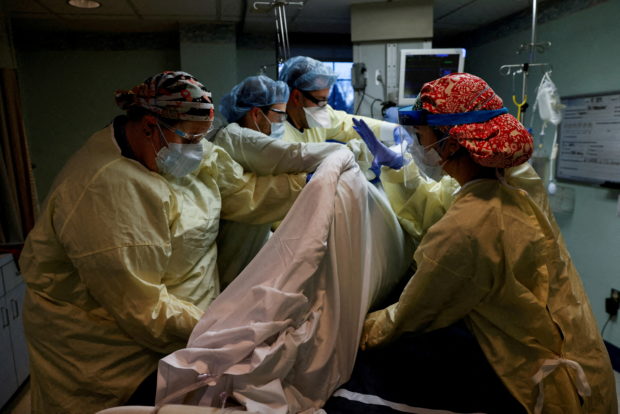US COVID peak may be over but not the pain as deaths rise

FILE PHOTO: Medical staff treat a coronavirus disease (COVID-19) patient in their isolation room on the Intensive Care Unit (ICU) at Western Reserve Hospital in Cuyahoga Falls, Ohio, U.S., January 4, 2022. REUTERS/Shannon Stapleton
NEW YORK — Even as COVID-19 cases drop and hospitalizations show signs of plateauing in hard-hit pockets of the United States, the still-rising death toll from the Omicron variant highlights the trail of loss that follows every virus surge.
Coronavirus deaths hit an 11-month high on Sunday, climbing 11% in the past week when compared to the prior week, according to a Reuters analysis.
COVID-19 fatalities are a lagging indicator, meaning their numbers usually rise a few weeks after new cases and hospitalizations.
The Omicron death toll has now surpassed the height of deaths caused by the more severe Delta variant when the seven-day average peaked at 2,078 on Sept. 23 last year. An average of 2,200 people a day, mostly unvaccinated, are now dying due to Omicron.
That is still below the peak of 3,300 lives lost a day during the surge in January 2021 as vaccines were just being rolled out.
Article continues after this advertisement“It will be a while until we see (a) decrease in death as very sick people with COVID remain hospitalized for a long time,” said Wafaa El-Sadr, a professor of epidemiology and medicine at Columbia University in New York City.
Article continues after this advertisementAs Omicron surged in December and earlier this month, hospital systems from New Jersey to New Mexico buckled under the sheer number of patients brought in by the apparently less severe but highly infectious variant, prompting the federal government to send military medical aid to six states.
“More infectious variants tend to run through a population very rapidly,” said El-Sadr in an email. “Even if such new variants cause less severe disease (particularly among those vaccinated and boosted), we will likely still see increase in hospitalizations and deaths due to vulnerability of unvaccinated and unboosted.”
COVID-19 hospitalizations are still setting records in some states including Arkansas and North Carolina. Nationally they are now under 147,000, compared with a peak of 152,746 on Jan. 20, the Reuters tally shows.
Cases nationally are down by 12% in the last seven days compared with the prior seven, the analysis found, prompting some health officials to strike a cautiously optimist tone on the trajectory of the pandemic.
“It’s certainly reached its peak in certain regions of the country,” Dr. Anthony Fauci, the nation’s top infectious disease official, said in an interview with MSNBC on Monday. “I believe that in the next few weeks we will see – as a country – that it is all turning around.”
U.S. COVID-19 data often lag a few days behind the actual state of affairs and paints an imperfect picture.
Positive findings from the now ubiquitous at-home tests are not included in the official case count, while hospitalization counts often do not differentiate between patients who are receiving treatment for COVID-19 and others who test positive while in the hospital with other issues.
On Monday, the head of the World Health Organization (WHO) warned that it was dangerous to assume Omicron would herald the end of COVID-19’s most acute phase, and exhorted nations to stay focused to beat the pandemic.
The Omicron wave scrambled the hopes of Americans for a gradual transition into a post-pandemic reality and re-ignited tensions around masking and vaccines in schools and workplaces, exposing once again the deep political fault lines cracked open by the health crisis.
On Sunday, large crowds rallied in Washington, D.C., in opposition of COVID-19 mandates, some holding signs that read “people call the shot, not the government.”
Virginia’s new Republican Governor Glenn Youngkin is facing a lawsuit from seven school boards seeking to stop his order that would make masks optional in school as of Monday.
A spokesperson for Youngkin, vowing to fight the lawsuit, said on Monday, “We are disappointed that these school boards are ignoring parent’s rights.”